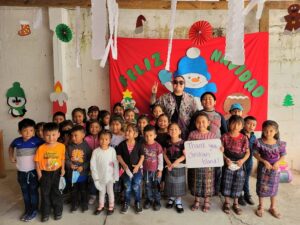Beausoleil First Nation Anishinaabekwe lends a helping hand in Central America

By Johnny Hawke
PANAJACHEL, GUATEMALA – A Beausoleil First Nation community member is helping to empower Indigenous children in Guatemala by volunteering through Fundamaya, a non-profit organization, as part of her continued commitment she holds close to her heart.
Trista Madsen, 38, arrived in Guatemala on Dec. 15 along with Christmas gifts donated from her community to deliver to the children she is volunteering for.
“I started my fundraising on the Island one week before I left and I thought it would be amazing to have our community be a part of what I’m doing,” says Madsen.
She is helping the Maya people in the small town of Panajachel, which is a town in the southwestern Guatemalan Highlands, less than 140 kilometres from Guatemala City. The Indigneous peoples of Guatemala highlands are the Maya who include the Achi, Akateko, Chuj, Ixil, Jakaltek, Kaqchikel, Kʼicheʼ, Mam, Poqomam, Poqomchiʼ, Qʼanjobʼal, Qʼeqchiʼ, Tzʼutujil, and Uspanteko.
Founded in 2007, Fundamaya is a charitable non-profit organization that collaborates with marginalized Indigenous Maya communities providing access to education, nutrition, shelter, and healthcare. The organization also works with volunteer groups who come and work with them with various on-the-ground needs such as building stoves, distributing water filters, activities at preschools, and serving the elderly.
The organization was born from the vision of a group of Indigenous Guatemalan, Australian, and American friends wanting to make a difference for those most in need.
Trista pays for her own travel but the organization helps her with accommodations in the heart of the community and will be volunteering until the end of February of this year.
Although Trista doesn’t call herself an activist, she is no stranger to community organizing and helping various causes. When she was 25, she organized an Awareness Campaign for Cancer where she rode her bike from Christian Island to Niagara Falls. She has also raised awareness for the homeless and spent a night in the cold in January one year to give attention to those who struggle and need support.
Trista first travelled to Guatemala five years ago where she met Fundamaya’s Cofounder and director, Sharon Smart.
“I came here for a vacation with my mom, which grew into so much more. I met Sharon Smart, and she told me about FundaMaya and so I started volunteering for the children every year,” Madsen recalls. “At first it was cooking for the preschool kids and helping with daily hygiene and Spanish. I was also learning so it helped learn basic Spanish.”
Co-founders Dwight Mara and Sharon Smart first met while travelling in Guatemala and fell in love not only with each other, but the area and people and felt a need to give their heart and skills to the people. Although they are non-Indigneous, Fundamaya’s Board members are from the Maya community and bring their culture into the programming. In 2019, Fundamaya partnered with U.S.-based organization, Action Alliance International, who help with cultural exchange and assisting in providing education and food needs.
In addition to her vocation for helping people and community is also part of an Indigenous prophecy from both Indigenous people of North and South America that talks about the Eagle and the Condor.
Grand Elder of the Living Maya Don Alejandro Cirilo Perez Oxlaj (Wandering Wolf) is a seventh generation priest from Guatemala and head of the Quiche Maya Elder Council. He has travelled throughout North America, comparing the prophecies of different tribes.
“Those of the Centre will unite the Eagle of the North with the Condor of the South. We will come together with our brothers and sisters because we are one – like fingers on the hand. Help us bring this message to all corners of the planet Earth,” says Grand Elder Oxlaj in a documentary film, Shift of Ages: Mayan Prophecies and the Eagle and the Condor.
The Anishinaabe peoples of the Great Lakes have a prophecy called the Seventh Fire. This prophecy, as shared in The Mishomis Book written by the late Eddie Benton-Banai, Grand Chief of the Midewiwin Medicine Society, speaks of the epoch we are in.
“It is this time that the light skinned race will be given a choice between two roads. One road will be green and lush, and very inviting. The other road will be black and charred, and walking it will cut their feet. In the prophecy, the people decide to take neither road, but instead to turn back, to remember and reclaim the wisdom of those who came before them. If they choose the right road, then the Seventh Fire will light the Eighth and final Fire, an eternal fire of peace, love, brotherhood, and sisterhood. If the light skinned race makes the wrong choice of the roads, then the destruction which they brought with them in coming to this country will come back at them and cause much suffering and death to all the Earth’s people.”
Madsen sees the similarities and interconnections between Indigenous people around the world and so, the love that she has for the Anishinaabe people is the same that she carries in all of her work wherever she goes.
“I just recently moved back to my community but always am excited to see what’s new and if there’s any opportunity I can help with,” notes Madsen. “I personally love my culture and the further I travel in Central America, the more I realize our cultures and practices are exactly the same. Just with different medicines. I think that’s why I probably feel at home when I travel these parts of the world – because the Indigenous people here are our brothers and sisters.”


